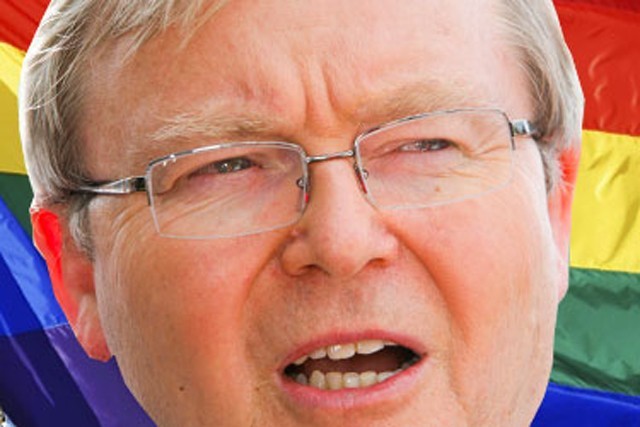Many are starting to see marriage equality as a vote-winning issue for the moribund Labor party. Might it be Rudd’s ticket in 2013?
At my five year old step-daughter’s school, the year began with a curriculum devoted to families.
All kinds, from a wide range of racial and religious backgrounds, were featured – but not families like ours.
Families with two mums or two dads did not appear, just as queer childhood classics like Heather Has Two Mommies and And Tango Makes Three are not available for borrowing from the school’s library.
Even now in 2013, to be gay, lesbian, bisexual or transgender means to rarely see yourself reflected in the world around you – and this goes doubly so for our child in the intensely heteronormative world of primary school.
Try this mental test: add up all the advertisements you’ve seen in the mainstream media featuring families with two mums or dads.
It’s thin pickings, isn’t it?
And yet, we’re there, quietly around you – at the kinder plays, the saturday sporting events, the school drop-offs.
Playground politics aside, Australian legal recognition of gay and lesbian relationships is comparatively decent on many fronts.
Since 2008, we have had Federal recognition of same-sex relationships in areas such as taxation, social security, immigration and citizenship.
One of the last acts of the Gillard government was on LGBTI aged care, and an amendment to the sex discrimination act which includes transgender and intersex people for the first time.
But a rather large pink elephant remains in the room: marriage equality.
With the Labor leadership spill, and Kevin Rudd now happily (the unkind might even say smugly) ensconced in the Lodge again, for the first time a sitting prime minister is now pro gay marriage.
Rudd’s change of heart is clearly designed to appeal to younger, technologically savvy voters.
At his first press conference on Thursday as prime minister, he stated that:
“Wherever I go in Australia, it just hits you in the face what young people think about this, which is that our current arrangements are just wrong and offensive to people … so I’ve got to say marriage equality [and] decent, world-class broadband – these are two selling points to young Australians, all of whom are wired for sound.
Furthermore, we are starting to see a consensus forming in Labor’s senior ranks, with Rudd joining Anthony Albanese and Senate leader Penny Wong on the pro side of the fence.
Rudd is proposing, however, to hold a referendum rather than taking legislation through Parliament.
This is not as strong a position as supporters of marriage equality might like, for as Tim Christodolou noted at this very site on Friday, “history tells us referendums are incredibly difficult to pass and often require bipartisan support. That’s unlikely to come from Abbott’s Coalition.”
Instead, many are starting to see marriage equality as a vote-winning issue for the moribund Labor party, a means of distinguishing the Rudd campaign from both the Gillard government and Tony Abbott’s Liberal party.
ACT Labor figure Andrew Barr called on the prime minister on Friday to: “make this part of his campaign to re-engage with young Australians in particular.
I certainly think it will assist the Labor Party in winning more support from LGBTI Australians and their families and friends. It’s a big constituency, and could well be the difference in terms of winning a number of seats in the lower house.
Where marriage equality was once an albatross for the Gillard government, it may well be Kevin Rudd’s ticket in 2013.
Author: Emily McAvan
Publication: the guardian
Date: 5 July 2013

